theartsdesk Q&A: Actor Robert Vaughn | reviews, news & interviews
theartsdesk Q&A: Actor Robert Vaughn
theartsdesk Q&A: Actor Robert Vaughn
An encounter with the former Napoleon Solo, who has died aged 83
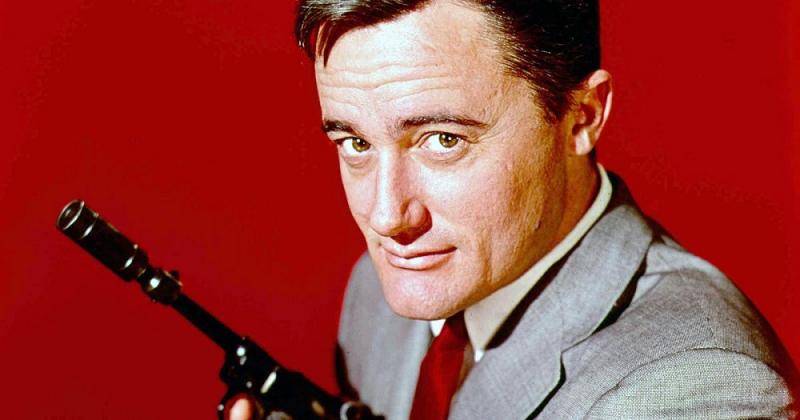
New York-born actor Robert Vaughn, who has died at the age of 83, achieved massive popular success when he starred as the sleek secret agent Napoleon Solo in The Man from U.N.C.L.E., which ran for four seasons from 1964 to 1968 and exploited the then-new James Bond mania to ratings-busting effect.
For such a seemingly all-American performer, Vaughn also worked extensively in the UK. In the early Seventies he played the unfeasibly affluent globe-trotting sleuth Harry Rule in Gerry Anderson's series The Protectors, and even though Vaughn apparently considered the show to be "tasteless junk" it was nonetheless a ratings hit. Spin forward three decades and Vaughn was one of the regulars in BBC One's Hustle, which ran for eight seasons from 2004 to 2012. And also in 2012, Vaughn popped up briefly as Milton Fanshaw in Coronation Street.
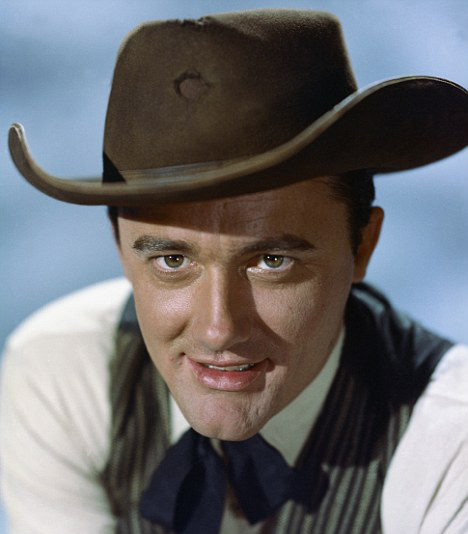 In 2013 he starred in Reginald Rose's legal drama Twelve Angry Men at the Garrick Theatre. Amid a cast which included Martin Shaw, Nick Moran and Jeff Fahey, he played juror number nine, embroiled in the fraught deliberations over whether a teenage delinquent should be given the death sentence for killing his father. "It's a wonderful cast of actors, and I'm proud to be associated with them," said Vaughn. This interview was conducted just before his 81st birthday, and revealed interests extending beyond stage and screen to politics, history and academia (Vaughn in The Magnificent Seven, above).
In 2013 he starred in Reginald Rose's legal drama Twelve Angry Men at the Garrick Theatre. Amid a cast which included Martin Shaw, Nick Moran and Jeff Fahey, he played juror number nine, embroiled in the fraught deliberations over whether a teenage delinquent should be given the death sentence for killing his father. "It's a wonderful cast of actors, and I'm proud to be associated with them," said Vaughn. This interview was conducted just before his 81st birthday, and revealed interests extending beyond stage and screen to politics, history and academia (Vaughn in The Magnificent Seven, above).
ADAM SWEETING: When this part came up, was Twelve Angry Men a piece you were familiar with?
ROBERT VAUGHN: I was acquainted with it because it had been done in America on television and on stage, and also there was a movie made of it in 1957 with Henry Fonda playing the principal role, which Martin Shaw is playing in this one. So I read it and I thought this is the best darn play I've read in a long time, all 12 of the people are so sharply defined in the script and it's really fascinating.
Some of them are very flashy dramatic roles but in the midst of it was one that appealed to me. He's juror number nine and he's referred to as the Old Man, and he's supposed to be between 75 and 80. In effect, although it doesn't appear on the first reading or even on the first viewing of the movie - which I did view several times - he solves the problem facing the jurors, and that's how I came to choose that particular role.
This play is daunting because all 12 actors are onstage every minute, every night. It's like 'Groundhog Day'
Who played him in the movie?
It's an actor named Joseph Sweeney and I don't know who he is. Everybody else in the movie is very well known, but Sweeney I never heard of before or since.
Does it say something important about the way the law works?
Well yes. We had the wisdom of our forefathers, the Brits, built into our Constitution. That if you are voting to put a man to death, and I guess they were hanging people in the 18th century, the forefathers decided that the 12 men of the jury had to be unanimous. Otherwise even if there was a slight possibility that one of the jurors believed the accused is not guilty of this crime then that's reasonable doubt and it's the end of the trial. They would then have a hung jury and they'd start over again. But I know there have been a couple of times when a group of lawyers got together to examine the script of Twelve Angry Men, and these lawyers proved to each other at any rate that they could have twisted the evidence in such a way as to reach the opposite verdict than the one in the play.
Some of the angry men in the play aren't as angry as others, are they?
No, they have less to be angry about. One guy just wants to get to the baseball game on time, he's gonna miss the game, that's his reason for voting guilty. Which is true of juries - you get people who have no good reasons at all to really vote, other than something like "I like to see my wife at seven o'clock instead of 11 o'clock so it's easier if I vote guilty."
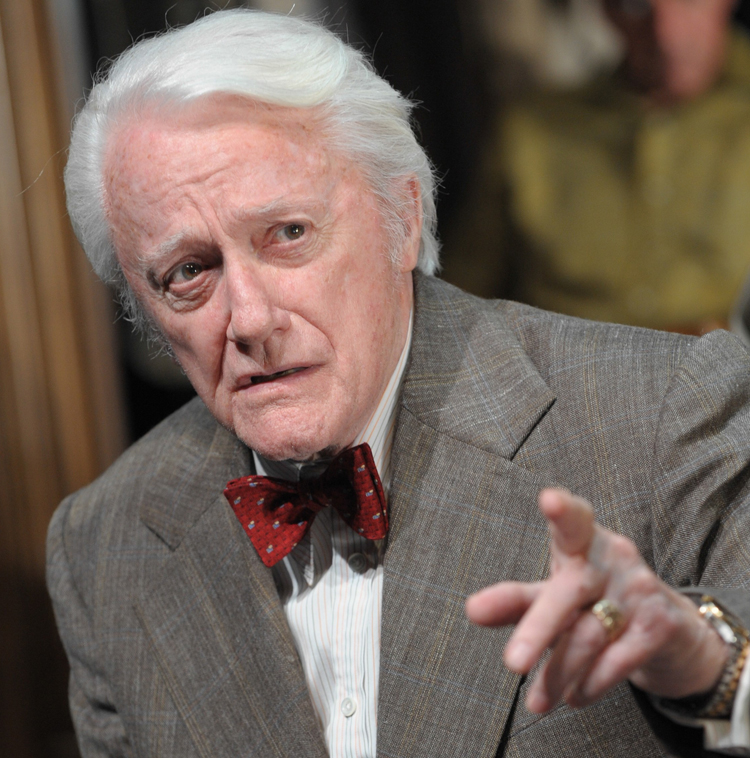 Have you ever served on a jury?
Have you ever served on a jury?
I have not, no. I avoided it as long as I could until I was too old and I didn't have to avoid it any longer. I just didn't want to get stuck in a six-month trial about somebody stealing apples from a cart or something, y'know.
You've done most of your work on camera, so is a stage play a daunting prospect?
Well I did a great deal of stage acting when I was young. In fact I played Hamlet twice, I played Franklin D Roosevelt, and I did Inherit the Wind, which is a wonderful play which Spencer Tracy did as a movie. But this play is particularly daunting because all 12 actors are onstage every minute of the play, every night of the show. Its kinda like Groundhog Day, you know that movie? Onstage at night I feel like the lights come up and there we are sitting there as we sat 24 hours earlier and 24 hours before that, and we will be doing this play until the end of February, sitting round this same table saying these same lines.
Overleaf: The Man from U.N.C.L.E., Steve McQueen and Bobby Kennedy
Do you have tricks to help you learn your lines?
I wish I did, because the only hard part about acting is learning the lines, and the other part is... it seems very obvious, but what you've got to create on that stage every night in the same role is the illusion that the person you're playing is saying those words, and no other words, for the first and only time they've ever been said in the history of mankind. You have said them that night at that time and it took you that many seconds to say them. And you've got to do that every night so it's an awesome responsibiilty. It's hard. It's so hard it's impossible.
It was The Man from U.N.C.L.E. that really broke you through to a huge audience, wasn't it?
Oh no question about it, because up until that time I had guest-starred in just about every Western - I did a lot of Westerns because I could ride, not well but well enough to ride in movies. We had all kinds of live TV shows at that time, like Playhouse 90 and Studio One, and I did all of them. That's a really terrifying experience to do a live TV show where you can't stop, you've got to keep going until it's over, and the whole country is looking at you at the same time. So it's kind of scary. I had done all those and the only security you ever have in this business is either a long run in a play or a long run in a TV series, so I told my agent to keep an eye out for something that would be considered worthwhile to do for the future, in terms of financial gain.
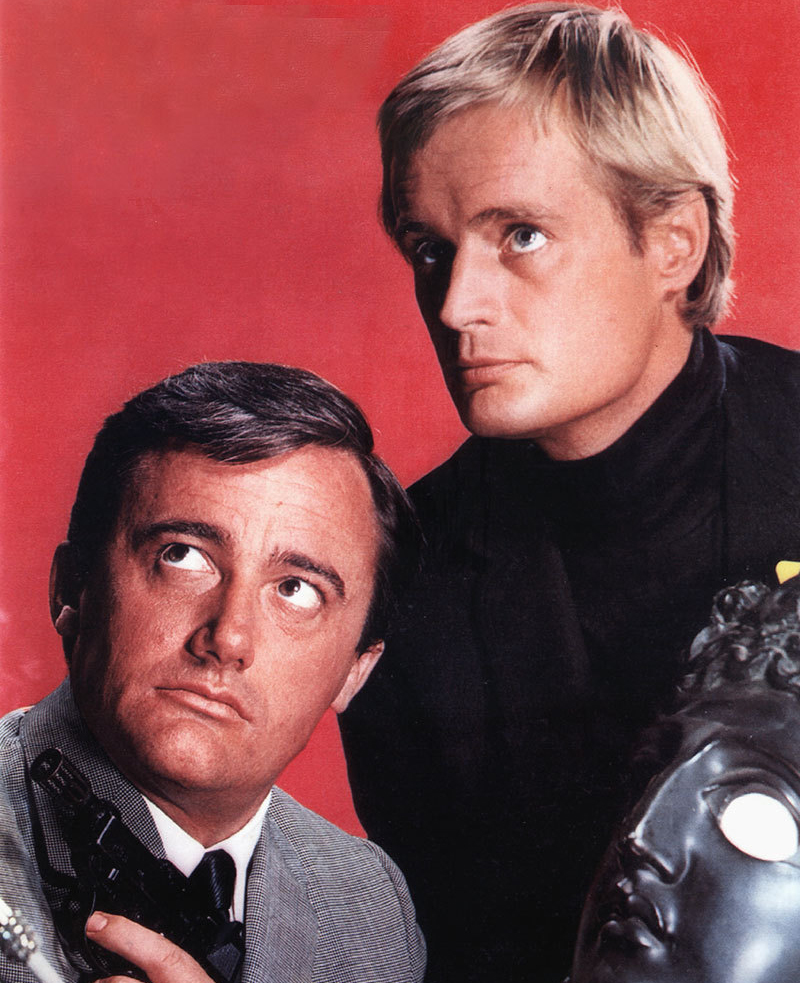 At that time the James Bond movies had just started to come out, From Russia with Love and Goldfinger, whatever the first ones were. And along came Man from U.N.C.L.E. Ian Fleming was a good friend of the man who created it [Norman Felton], so they really were trying to do James Bond on television and lo and behold, they accepted me to be James Bond on TV. They did an interesting thing to find out whether I had enough appeal for the job - they went around and interviewed a lot of girls that I had dated, and they wanted to know "do you think he's got enough pizzazz" or whatever, and I guess I got the vote. I had enough of whatever was necessary and that's how it came about.
At that time the James Bond movies had just started to come out, From Russia with Love and Goldfinger, whatever the first ones were. And along came Man from U.N.C.L.E. Ian Fleming was a good friend of the man who created it [Norman Felton], so they really were trying to do James Bond on television and lo and behold, they accepted me to be James Bond on TV. They did an interesting thing to find out whether I had enough appeal for the job - they went around and interviewed a lot of girls that I had dated, and they wanted to know "do you think he's got enough pizzazz" or whatever, and I guess I got the vote. I had enough of whatever was necessary and that's how it came about.
You were renowned for being a very suave operator.
I guess so, yeah. I'm actually not at all like that person, I'm more of a slob as my wife will attest.
Do you still see your former Man from U.N.C.L.E. co-star David McCallum? (Vaughn with McCallum as Illya Kuryakin, pictured above)
We don't see each other a great deal, though we live fairly close to each other. He lives in New York City and I live in Connecticut, about an hour north of NYC. We always call each other on our birthdays and say hello. He's in the huge American hit NCIS, and I think he's been in that for about 10 years.
I liked that role you played in Bullitt, the slimy politician called Chalmers?
If you've been in a hit show like U.N.C.L.E., the best thing that can happen to you is when you get out of that hit TV show you get into a good movie. Fortunately the first movie I did after U.N.C.L.E. was Bullitt. My good friend Steve McQueen had the wisdom to cast me in the role opposite him in the picture, which was a huge financial success, and now it's kinda gone down as the movie that had the best car chase, before there were car chases. It really was a great car chase, because it wasn't done theatrically in terms of tricks. Those were two guys in those two cars driving all over San Francisco one Sunday afternoon.
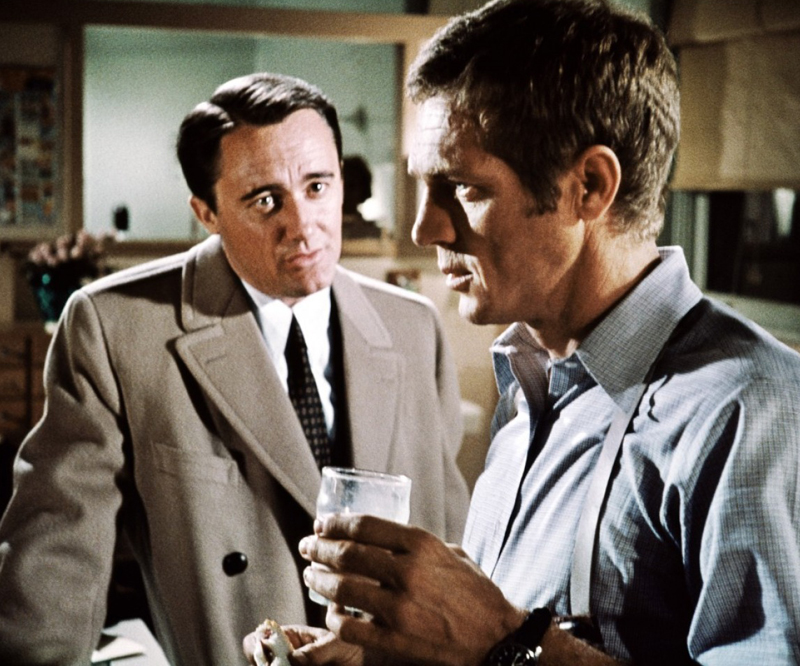 Did McQueen drive the Mustang himself?
Did McQueen drive the Mustang himself?
Well I think he did. The insurance company said they wouldn't insure the picture or McQueen if he did it, but I think in some of the longer shots he sneaked in and did it, because he loved to drive. Most of the drivers I'm aware of all said that he could have made a handsome living as a driver, as could Paul Newman. They both really were skilled drivers. And James Garner too (Vaughn with McQueen in Bullitt, above).
You were also in The Magnificent Seven and The Towering Inferno with McQueen, so you must have known him pretty well?
Very well, yeah. He was an oddball guy. His attraction on screen was the same thing he had in person. There was something offbeat about him, he wasn't like anyone else. He wasn't easy to like, but I liked him because there was something interesting about him. I've always said - and I know I'm correct in this sagacious observation - that the essence of stardom in movies is sex appeal. If women find you attractive you're home free. If you can also act a little bit it helps too. And Steve had super sex appeal. When we were filming Bullitt they'd stand there behind screens looking at him, like "if I could get my hands on him for one second..." . And he had an international appeal, women all over the world liked him.
Acting aside, you have an academic bent too. In fact you have a PhD in Political Science. Was academe ever a career option for you?
It always had been kind of an option until the Vietnam war came along and I publicly and enthusiastically made myself an opponent of the war. A lot of people at the time - this was the early Sixties - said, "What does he know about the war? Does he have policy papers in front of him every morning like the President has to?" Well that's bullshit. Unless it's secret for some reason, public papers are available any time you want to get your hands on them, and particularly the history of the war in Vietnam. So I decided that maybe my opposition and arguments against the war would have more validity if I actually finished my doctorate, which I was in the midst of doing, so that's what I did. It did make a difference. I was invited to many more lofty places to speak, like Harvard and so on, that I wasn't invited to before I became Dr Vaughn. The great wisdom of a PhD!
Robert Kennedy looked at me and said 'what would Napoleon Solo do in this situation, Mr Vaughn?'
And you had a keen interest in politics?
The political side was just Vietnam. I was not actively involved with any other candidate except Robert Kennedy, who I knew personally, and I enthusiastically supported him for president in 1968. And of course he was killed in the last primary, the California primary in June of 1968. But I wasn't a Democrat or a Republican, if anything I probably was a libertarian, whatever that means - I don't know. It means you're not a Democrat or a Republican. Non-aligned.
How did you know Bobby Kennedy?
When I was doing my doctorate work at the University of Southern California he came to speak at the school. The Kennedys had a thing that they always used Lincoln Continental cars when they were on the campaign trail, because the rear of the Lincoln was flat and they could get up on the rear flat end and stand there and be comfortable. I went out into the audience to hear him, it was an outdoor thing, very crowded, he looked down at me and said [imitates Kennedy's New England drawl], "Well what would Napoleon Solo do in this situation, Mr Vaughn?" - that's how he talked - and so I knew he was aware of Man from U.N.C.L.E.. Then as a result of that I got to know all his children very well and I was a house guest a lot of times when I was on the East Coast, because the kids loved the show so they'd invite me. Then out of that grew my involvement with the anti-war movement, and Kennedy was in fact the leader of the anti-war movement. So that's how I got to know him, and I saw his best and worst moments, his unhappiest moments.
The end of the Sixties was a bleak period in the USA?
A terrible time, and then Richard Nixon became President in 1968 and had to resign in '74. They were trying times for the country, because watching a leader who had been elected by a huge landslide then being forced to resign was a stunning thing for the government and for America I think. It definitely shook my faith in the American system. Nixon was a tragic, almost Greek character in the sense that he had a brilliant mind. Even people who disliked him intensely thought he had a brilliant analytical mind, in terms of foreign policy particularly. He opened the door to China and no Democrat could have done that. He knew all the world leaders of his time on a first name basis, so he was able to pick up the phone and talk to Brezhnev or Gromyko or whoever he had to talk to, because they respected him. But he was a deeply flawed character, that all came out with Watergate of course. I never met him - I would like to have met him, I think it would have been fascinating. It would have been fascinating to meet Hitler too I guess. If you didn't know his record (below, Vaughn as Major Krüger in The Bridge at Remagen, 1969).
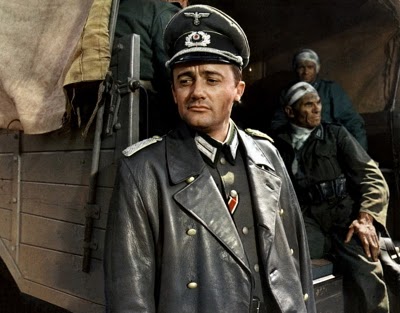 As an actor, you've played several Presidents, I think?
As an actor, you've played several Presidents, I think?
I've played Woodrow Wilson, Franklin D Roosevelt, Teddy Roosevelt, Harry Truman and Nixon. Five of 'em! I never got to play John F Kennedy, but enough has been said about him and his extra-political activities. A book came out about 10 years ago about all the drugs he was taking, not to get high but to cope with a variety of health conditions he had all his life. I know Bobby Kennedy said he never had a day of his life without pain - even when he was a young man he was in constant pain all the time because of his back problem. He took a lot of cortisone, and cortisone has three side effects that I know of. One of them is bloating of the face, and you see pictures of John Kennedy at different times in his life and there's a huge difference in his face. The second thing is a sense of megalomania - you could attribute that to anybody who wanted to be President. And the last thing was a highly developed sex drive, so he had them all.
Share this article
The future of Arts Journalism
You can stop theartsdesk.com closing!
We urgently need financing to survive. Our fundraising drive has thus far raised £49,000 but we need to reach £100,000 or we will be forced to close. Please contribute here: https://gofund.me/c3f6033d
And if you can forward this information to anyone who might assist, we’d be grateful.

Subscribe to theartsdesk.com
Thank you for continuing to read our work on theartsdesk.com. For unlimited access to every article in its entirety, including our archive of more than 15,000 pieces, we're asking for £5 per month or £40 per year. We feel it's a very good deal, and hope you do too.
To take a subscription now simply click here.
And if you're looking for that extra gift for a friend or family member, why not treat them to a theartsdesk.com gift subscription?

Add comment